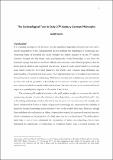Files in this item
The eschatological turn in German philosophy
Item metadata
| dc.contributor.author | Wolfe, Judith | |
| dc.date.accessioned | 2020-11-23T00:38:01Z | |
| dc.date.available | 2020-11-23T00:38:01Z | |
| dc.date.issued | 2019-01 | |
| dc.identifier | 250248402 | |
| dc.identifier | 85e172fd-280c-4022-9c37-cafe6318c866 | |
| dc.identifier | 85057179401 | |
| dc.identifier | 000459617400005 | |
| dc.identifier.citation | Wolfe , J 2019 , ' The eschatological turn in German philosophy ' , Modern Theology , vol. 35 , no. 1 , pp. 55-70 . https://doi.org/10.1111/moth.12460 | en |
| dc.identifier.issn | 0266-7177 | |
| dc.identifier.other | ORCID: /0000-0003-3933-6241/work/54819349 | |
| dc.identifier.uri | https://hdl.handle.net/10023/21032 | |
| dc.description | The author thanks the University of St Andrews and the J. & A. Deas Fund for supporting this research. | en |
| dc.description.abstract | This article argues that modern European philosophy was significantly shaped by the transposition of eschatology from a theological into a philosophical register. By ‘eschatology’, I here mean thought about the ‘last things’ as they relate to present systems of life and action; and about those systems as determined, at least in part, by their end. I take as my starting point the claim that the scepticism regarding revelation that was such a central characteristic of the Enlightenment did not eradicate the importance of eschatology as a structuring frame of historical and moral thought, but merely changed it. Modern theologians and philosophers tended to shift the ground of eschatology from revelation to the inner logic of a system; eschatology was seen as legitimated by, and in turn legitimating, the shape of a given philosophical account of history. The questions and challenges arising from this shift were important drivers of early twentieth‐century European philosophy. This article works out this claim through indicative accounts of several large debates of early twentieth‐century philosophies of history and of politics as contestations about the meaning of eschatology: the crisis of historicism, the rise of existentialism, and the surge of political religions. It concludes with a discussion of Martin Heidegger’s eschatological thought of the 1930s, illuminated by the recent publication of his Black Notebooks. | |
| dc.format.extent | 557992 | |
| dc.language.iso | eng | |
| dc.relation.ispartof | Modern Theology | en |
| dc.subject | BL Religion | en |
| dc.subject | B Philosophy (General) | en |
| dc.subject | T-NDAS | en |
| dc.subject | BDC | en |
| dc.subject | R2C | en |
| dc.subject.lcc | BL | en |
| dc.subject.lcc | B1 | en |
| dc.title | The eschatological turn in German philosophy | en |
| dc.type | Journal article | en |
| dc.contributor.institution | University of St Andrews. School of Divinity | en |
| dc.identifier.doi | https://doi.org/10.1111/moth.12460 | |
| dc.description.status | Peer reviewed | en |
| dc.date.embargoedUntil | 2020-11-23 |
This item appears in the following Collection(s)
Items in the St Andrews Research Repository are protected by copyright, with all rights reserved, unless otherwise indicated.

